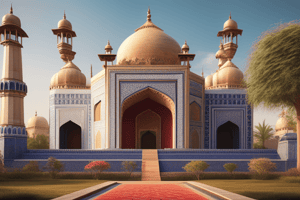Podcast
Questions and Answers
In what year did Akbar end the pilgrimage tax?
In what year did Akbar end the pilgrimage tax?
- 1562
- 1563 (correct)
- 1564
- 1571
Which of the following decisions was made by Akbar in 1578?
Which of the following decisions was made by Akbar in 1578?
- Establishment of Fatehpur Sikri
- Permission for all religions to enter Ibadat Khana (correct)
- End of Jaziya tax
- Declaration of Mazhar
When was the establishment of Din-e-Ilahi announced?
When was the establishment of Din-e-Ilahi announced?
- 1583
- 1579
- 1582 (correct)
- 1585
Which event marks the capital's relocation from Agra to Fatehpur Sikri?
Which event marks the capital's relocation from Agra to Fatehpur Sikri?
What significant change occurred in 1585 during Akbar's reign?
What significant change occurred in 1585 during Akbar's reign?
What notable action did Akbar take in 1564 concerning taxation?
What notable action did Akbar take in 1564 concerning taxation?
What was established by Akbar in 1575 that allowed for religious discussion among different faiths?
What was established by Akbar in 1575 that allowed for religious discussion among different faiths?
What significant religious framework did Akbar initiate in 1582?
What significant religious framework did Akbar initiate in 1582?
Which of the following events took place after the end of slavery in 1562 during Akbar's rule?
Which of the following events took place after the end of slavery in 1562 during Akbar's rule?
When did Akbar declare the Mazhar, which was crucial for his religious policies?
When did Akbar declare the Mazhar, which was crucial for his religious policies?
What was a major religious contribution made by Akbar in the year 1583?
What was a major religious contribution made by Akbar in the year 1583?
Which action taken by Akbar in 1579 significantly impacted religious policy in his empire?
Which action taken by Akbar in 1579 significantly impacted religious policy in his empire?
What significant political move did Akbar make in 1585 related to the governance of his empire?
What significant political move did Akbar make in 1585 related to the governance of his empire?
In which year did Akbar initiate the religious gathering at Ibadat Khana that welcomed individuals from all faiths?
In which year did Akbar initiate the religious gathering at Ibadat Khana that welcomed individuals from all faiths?
Which of the following actions occurred immediately before the end of the Jaziya tax in 1564?
Which of the following actions occurred immediately before the end of the Jaziya tax in 1564?
Which of the following actions by Akbar is chronologically closest to the establishment of Ibadat Khana in 1575?
Which of the following actions by Akbar is chronologically closest to the establishment of Ibadat Khana in 1575?
What was the primary objective of the establishment of Din-e-Ilahi by Akbar in 1582?
What was the primary objective of the establishment of Din-e-Ilahi by Akbar in 1582?
Which event marked a significant shift in Akbar's approach to religious inclusivity?
Which event marked a significant shift in Akbar's approach to religious inclusivity?
Which of these reforms or actions took place during the same decade as the relocation of the capital to Lahore?
Which of these reforms or actions took place during the same decade as the relocation of the capital to Lahore?
What significant tax reform occurred immediately after Akbar's decision to end the pilgrimage tax?
What significant tax reform occurred immediately after Akbar's decision to end the pilgrimage tax?
What was the primary change implemented by Akbar in 1562 that affected social structures?
What was the primary change implemented by Akbar in 1562 that affected social structures?
Which significant milestone for Akbar's religious policy occurred in 1578?
Which significant milestone for Akbar's religious policy occurred in 1578?
What reform was introduced in 1563, within Akbar's taxation policies?
What reform was introduced in 1563, within Akbar's taxation policies?
What was established in 1575 that served as a forum for religious debate?
What was established in 1575 that served as a forum for religious debate?
Which of the following events occurred first during Akbar's reign in the year 1582?
Which of the following events occurred first during Akbar's reign in the year 1582?
Flashcards are hidden until you start studying
Study Notes
Key Events in Akbar's Reign
- Abolition of Slavery (1562): Emperor Akbar abolished slavery, representing a significant step towards social justice. This act freed individuals from bondage and marked a shift in societal norms.
- Freedom from Harem (1562): Akbar freed himself from the traditional confinement of the royal harem, signifying his desire for personal independence and a more open approach to governance.
- Elimination of Pilgrimage Tax (1563): This move eased financial burdens on pilgrims and encouraged religious freedom, showcasing Akbar's commitment to religious tolerance.
- Abolishment of Jizya Tax (1564): The Jizya tax, levied on non-Muslims, was abolished, demonstrating Akbar's intent to treat all subjects equally.
- Establishment of Fatehpur Sikri (1571): Akbar established the city of Fatehpur Sikri as his capital, showcasing his architectural vision and a desire for a new administrative center.
- Foundation of Ibadat Khana (1575): Akbar established the Ibadat Khana, a place of worship for all religions, to foster interfaith dialogue and promote religious understanding.
- Inclusion of All Religions at Ibadat Khana (1578): Akbar invited scholars and religious figures from diverse faiths to engage in discussions at the Ibadat Khana, aiming to find common ground and bridge religious divides.
- Declaration of Mazhar (1579): Akbar declared the Mazhar, a proclamation declaring his supreme authority and confirming his religious beliefs, marking a significant step in his own religious development.
- Establishment of Din-e-Ilahi (1582): Akbar established a new religion, Din-e-Ilahi, which aimed to synthesize elements from various faiths and promote a universal moral code, showcasing his pursuit of spiritual unity.
- Inception of Ilahi Samvat (1583): Akbar introduced a new calendar system, known as the Ilahi Samvat, to promote a unified system of timekeeping and demonstrate his ambition to create a new era.
- Shift of Capital to Lahore (1585): Akbar shifted his capital to Lahore, expanding his administrative reach and securing control over strategic territories.
Key Events and Policies of Akbar's Reign
- Abolished Slavery (1562): Akbar recognized the inherent injustice of slavery and ended the practice within his kingdom.
- Liberation from Harem (1562): A significant step for the advancement of women, Akbar freed himself from the traditional confinement of the royal harem.
- Elimination of Pilgrimage Tax (1563): This tax, levied on pilgrims traveling to holy sites, was abolished by Akbar to promote religious freedom and ease the burden on people.
- Abolition of Jizya Tax (1564): Jizya was a tax levied on non-Muslim subjects of Muslim rulers. Akbar's decision to abolish it demonstrated his commitment to religious tolerance.
- Establishment of Fatehpur Sikri (1571): Akbar constructed this magnificent city, strategically located near Agra. It was a testament to his architectural ambitions and became a center of learning and cultural exchange.
- Foundation of Ibadat Khana (1575): Also known as the "House of Worship," this was a place where scholars and religious figures from different faiths could meet and discuss religious ideas.
- Open Door Policy for Ibadat Khana (1578): Akbar extended an invitation for people of all faiths to engage in discussions and intellectual pursuits within the Ibadat Khana, promoting interfaith dialogue.
- Declaration of Mazhar (1579): Akbar declared this document, proclaiming himself as the supreme authority of justice and law in the kingdom.
- Introduction of Din-e-Ilahi (1582): Akbar formulated a syncretic faith, combining elements from Hinduism, Islam, and other religions. This faith emphasized universal morality and divine unity.
- Establishment of Ilahi Samvat (1583): Akbar introduced a new calendar system, known as the Ilahi Samvat, to unify his empire and create a shared sense of time and history.
- Shift of Capital to Lahore (1585): Akbar moved his capital to Lahore, strategically located in the northwest, to ensure its control over this territory.
### Akbar's Important Works
- End of Slavery: In 1562, Akbar abolished slavery. This was a significant step toward social justice and equal rights.
- Akbar Freed from Haremdal: Also in 1562, Akbar was freed from the harem, indicating a shift in his rule towards a more active and involved approach to governance.
- End of Pilgrimage Tax: In 1563, Akbar abolished the pilgrimage tax, making it easier for people of all faiths to access sacred sites.
- End of Jaziya Tax: In 1564, Akbar abolished the Jaziya tax, a tax levied on non-Muslims. This was a significant step towards religious tolerance and equality.
- Establishment of Fatehpur Sikri: In 1571, Akbar established the city of Fatehpur Sikri and moved his capital there from Agra. This city was built to house the Mughal court and became a center of culture and learning under Akbar's patronage.
- Establishment of Ibadat Khana: Akbar founded the Ibadat Khana in 1575. This house of worship was designed to facilitate religious dialogue and understanding between different faith communities.
- Permission to Enter The Ibadat Khana: In 1578, Akbar allowed people of all religions to enter the Ibadat Khana, promoting interfaith dialogue and tolerance.
- Declaration of Mazhar: Akbar declared his faith in the divine, known as the "Mazhar," in 1579. This declaration emphasized Akbar's belief in a universal, divine presence.
- Establishment of Din-e-Ilahi: Akbar founded a new syncretic religion, called Din-e-Ilahi, in 1582. It was a blend of Islamic, Hindu, and Zoroastrian teachings.
- Beginning of Ilahi Samvat: In 1583, Akbar introduced his own calendar system known as Ilahi Samvat, which started from the year of his accession.
- Shifting the Capital to Lahore: In 1585, Akbar shifted his capital from Fatehpur Sikri to Lahore, likely due to considerations of strategic location and political circumstances.
Key Events in Akbar's Reign
-
Akbar abolished slavery in 1562.
-
Akbar freed himself from the constraints of the harem in 1562.
-
Akbar ended the pilgrimage tax in 1563.
-
Akbar abolished the Jaziya tax (a tax levied on non-Muslims) in 1564.
-
In 1571, Akbar established Fatehpur Sikri and shifted the capital from Agra.
-
Akbar established the Ibadat Khana (a "House of Worship") in 1575.
-
Akbar permitted people of all religions to enter the Ibadat Khana in 1578 as a place for religious discourse.
-
Akbar declared the Mazhar (a decree) in 1579.
-
Akbar established the Din-e-Ilahi (a syncretic religion) in 1582.
-
Akbar began the Ilahi Samvat (a new calendar) in 1583.
-
In 1585, Akbar shifted the capital from Fatehpur Sikri to Lahore.
Akbar's Reforms
- Akbar ended slavery in 1562, freeing people from forced labor
- Akbar was freed from the harem in 1562, signifying a shift in his rule towards a more public and active role
- The pilgrimage tax was abolished in 1563, promoting religious freedom
- The Jaziya tax, imposed on non-Muslims, was abolished in 1564, further promoting religious tolerance
- The city of Fatehpur Sikri was established in 1571, becoming the capital of the Mughal empire, signifying a shift in power and administration
- Akbar established the Ibadat Khana in 1575, a house of worship where he invited scholars from different religions to discuss their beliefs
- In 1578, Akbar opened the Ibadat Khana to people of all religions, promoting interfaith dialogue and religious harmony
- The Mazhar, a declaration of religious tolerance, was issued in 1579, stating that Akbar considered himself above all religions and believed in the freedom of conscience.
- Akbar established Din-e-Ilahi in 1582, a syncretic faith that drew inspiration from various religions, reflecting his efforts to create a unified religious ideology
- The Ilahi Samvat, a calendar era, was introduced in 1583, marking a significant change in the Mughal official calendar
- Akbar shifted the capital to Lahore in 1585, showcasing a strategic move to secure control over the North West frontier.
Studying That Suits You
Use AI to generate personalized quizzes and flashcards to suit your learning preferences.




